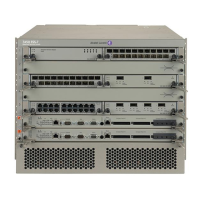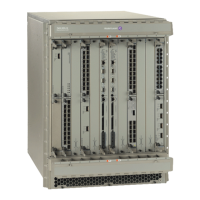Configuring MPLS-TP
Page 90 7450 ESS MPLS Guide
Proactive CC/CV (using BFD) Configuration
Generally applicable proactive OAM parameters are configured using templates.
Proactive CC and CV uses BFD parameters such as Tx/Rx timer intervals, multiplier and other
session/fault management parameters which are specific to BFD. These are configured using a
BFD Template. The BFD Template may be used for non-MPLS-TP applications of BFD, and
therefore contains the full set of possible configuration parameters for BFD. Only a sub-set of
these may be used for any given application.
Generic MPLS-TP OAM and fault management parameters are configured in the OAM Template.
Named templates are referenced from the MPLS-TP Path MEP configuration, so different
parameter values are possible for the working and protect paths of a tunnel.
The BFD Template is configured as follows:
config
router
bfd
[no] bfd-template <name>
[no] transmit-interval <transmit-interval>
[no] receive-interval <receive-interval>
[no] echo-receive <echo-interval>
[no] multiplier <multiplier>
[no] type <cpm-np>
exit
The parameters are as follows:
• transmit-interval transmit-interval and the rx receive-interval: These are the transmit
and receive timers for BFD packets. If the template is used for MPLS-TP, then these are
the timers used by CC packets. Values are in milliseconds: 10ms to 100,000ms, with 1ms
granularity. Default 10ms for CPM3 or better, 1 sec for other hardware. Note that for
MPLS-TP CV packets, a transmit interval of 1 sec is always used.
• multiplier multiplier: Integer 3 – 20. Default: 3. This parameter is ignored for MPLS-TP
combined cc-v BFD sessions, and the default of 3 used, as per RFC6428.
• echo-receive echo-interval: Sets the minimum echo receive interval, in milliseconds, for a
session. Values: 100ms – 100,000ms. Default: 100. This parameter is not used by a BFD
session for MPLS-TP.
• type cpm-np: This selects the CPM network processor as the local termination point for
the BFD session. This is enabled by default.
Note that if the above BFD timer values are changed in a given template, any BFD sessions on
MEPs to which that template is bound will try to renegotiate their timers to the new values. Note
that the BFD implementations in some MPLS-TP peer nodes may not be able handle this
renegotiation, as allowed by Section 3.7.1 of RFC6428 and may take the BFD session down. This
